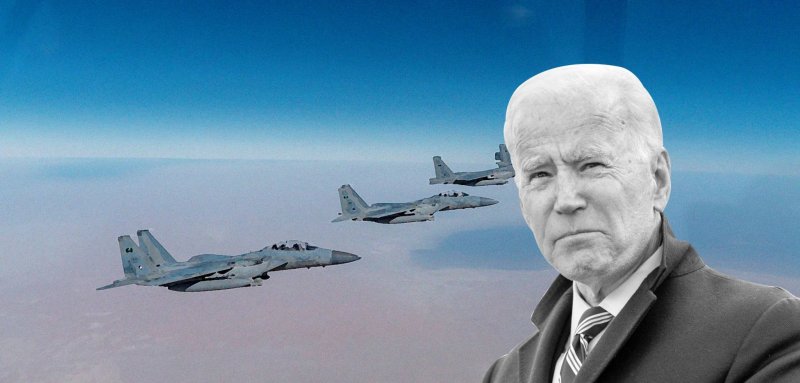Accused of ambiguity, Biden delivered his foreign policy speech declaring an end of US support for “offensive” operations in Yemen. The word has provoked ire among Yemeni and non-Yemeni activists as well as human rights defenders as they found in his statement an intended ambiguity to keep the door open for a reversal of the arms sales freeze under the pretext of helping Saudi Arabia defend its territorial integrity.
There’s a fine line to be drawn between offensive and defensive operations especially when Saudi Arabia is supposed to be acting in self-defence against the Houthi “aggressor”. Ending “offensive” support when it is regarded as being “defensive” by Saudi Arabia throws into question the ways in which KSA will frame its operations in Yemen and what form US support will take.
Many rejoiced at the arms sales freeze announced by Biden as soon as he took office, revoking endless military support for Saudi Arabia and UAE which was in place during the Trump administration. Biden's announcement came within 10 days of taking office as the government paused arms sales and transfers to Gulf states, militarily intervening in Yemen’s conflict including a $23 billion dollar sale to UAE and a $478 million sale to KSA.
To believe that the US would give up its strategic alliance with the Gulf nations just to defend a rather far-fetched human rights agenda in the region is rather ambitious, to expect the US to risk the US-Gulf alliance which stands up to Iran’s expansion in the region is rather too simplistic. #YemenCantWait
This came as Biden wishes to restore global leadership and reposition the US as the major player it once was with the mantle of restoring its power as it signals a withdrawal of support to endless wars and unconditional support to the Gulf nations. Biden’s commitment to revoking arms sales comes against a number of campaign pledges that he made to hold the US to higher standards as it stands accused of human rights violations and is legally liable for some of the atrocities in Yemen as a result of the US support to the Saudi-led coalition with arms in addition to logistical and intelligence support — all of which makes it accused of alleged crimes in violation of both human rights law and international humanitarian law. However, rejoicing these seemingly mixed messages rife with loopholes that could easily be manipulated by the Saudi regime or the UAE in order to continue their war in Yemen under the pretext of fighting terrorism and terrorist attacks on its land, which by the way is protected by international laws. How can the USA end support to KSA when the latter is allegedly on the defense as Houthis continue their attack on its territories and oil facilities striking in the Saudi heartland.
The caveats in Biden statement are thought to be deliberately introduced as the US tries to offer the Saudi something up as some form of appeasement as the US contemplates rejoining the JCPOA that the Saudis strongly oppose.
To believe that the US would give up its strategic alliance with the Gulf nations just to defend a rather far-fetched human rights agenda in the region is rather ambitious, and to even expect the US to risk the US-Gulf alliance which stands up to Iran’s expansion in the region is rather too simplistic. This leaves us with one plausible read up on future US-Gulf relations which is that Biden’s is potentially willing to go the extra mile in fulfilling his election manifesto with regards to ending US involvement in the Yemen conflict, while tacitly continuing support to KSA and UAE as it sees fit and in line with US-Gulf common interests in particular when it comes to confronting what they characterize as Iran’s “malign” activities in the region.
To think that human rights agendas for our region would outweigh US-Gulf historic and strategic alliances is at the least unrealistic and at best too hopeful. The expectation that the US must play the role of a policeman in the region is also unfeasible given that the Arab population oppose what they consider America’s meddling in the region. As the Arab nations commemorate the 10th anniversaries of the Arab Spring seeking freedom from autocratic rule and dictatorships, our best hope lies within the peoples to take up a leadership role of holding their rulers to account. An active civil society, with a proactive role for women and youth, inside Arab nation and abroad could play a leadership role to put pressure on ending western governments' involvement in Yemen and are legitimate bearers of power, no matter the suffering and however long the struggle. Whether an arms export freeze by the US, even if vigorously implemented, will spell an end to the Yemeni war remains to be seen. The efficacy of the freeze is limited if not coupled with other western nations mainly France and the UK, after Italy issued a similar decision, following the US. The answer lies between two camps: the optimists and realists; The ultimate truth lies in Biden’s foreign policy speech when he said: “At the same time, we’re going to continue to support and help Saudi Arabia defend its sovereignty and its territorial integrity and its people.”
Raseef22 is a not for profit entity. Our focus is on quality journalism. Every contribution to the NasRaseef membership goes directly towards journalism production. We stand independent, not accepting corporate sponsorships, sponsored content or political funding.
Support our mission to keep Raseef22 available to all readers by clicking here!
Interested in writing with us? Check our pitch process here!





